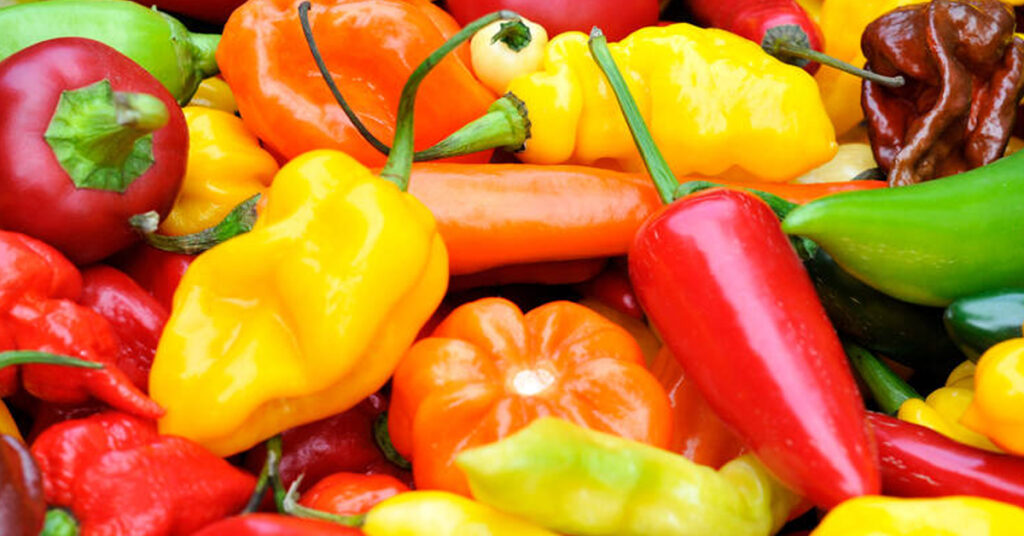This vegetable has specific taste characteristics and a really wide range of uses.
Pepper ( Capsicum annuum ) is a perennial vegetable plant of the flowering plant family Solanaceae, which also includes potatoes, tomatoes, etc. It is found in many colors and shapes.
You probably have heard that peppers are perhaps the richest natural source of vitamin C. Richer than lemon and orange.

Table of Contents
Why should we keep the habit of eating peppers?
High nutritional value
Peppers are a highly nutritious food, ie they have high nutritional and low calorific value. They contain a high percentage of water (over 92%).
100g of fresh pepper contains only 31kcal, of 6g of carbohydrates (4.2g of sugars), 1g of protein, and 0.3g of fat.
Also, the amount of fiber is great – 2.1g.
Fructose and glucose are responsible for the sweet taste.
As for the micronutrient composition, it is fascinating. Apart from being one of the richest sources of vitamin C (169% of the daily recommended intake), peppers are also a good source of vitamin B6, vitamin K, potassium, iron, folic acid, and provitamin A.
High antioxidant value
Peppers are a rich source of a range of powerful antioxidants, including:
- Capsaicin – particularly present in red peppers, a potent antioxidant responsible for the red color.
- Violaxanthin – the most common carotenoid antioxidant in yellow peppers.
- Lutein – very important for eye health, most common in green peppers.
- Quercetin – a polyphenolic antioxidant that in several studies has proven to be a protector against some chronic diseases – diabetes, malignant and cardiovascular diseases, etc.
- Luteolin – also a polyphenolic antioxidant, with many health benefits.
Antioxidants are the body’s defense mechanism against free radicals – damaging elements that exist are produced as metabolic waste in the body and oxidatively damage its various cells and tissues. The body has mechanisms to produce a certain percentage of necessary antioxidants, but still generally depends on the intake.
Permanent oxidative damage leads to processes of chronic inflammation or inflammation, which in the long run is one of the main reasons for the development of chronic diseases.
Food suitable for weight loss
Almost all vegetables are high-nutrient foods, rich in fiber. This makes it a particularly suitable food for weight loss. Apart from the fact that you can practically not overdo it, it will provide you with a range of micronutrients and antioxidant components with various beneficial effects on the body.
Fiber studies have linked peppers to faster and more successful weight loss.
This is because they lower the glycemic index of food and bind water in the stomach, which promotes satiety. They are food for the beneficial intestinal microflora, on whose balance the overall health depends.
Peppers are great for eye health
This property is due, above all, to 2 reasons. Provitamin A and the powerful antioxidant lutein. Also, zeaxanthin is present in slightly smaller quantities in peppers.
These are the two antioxidant components that a series of studies have linked to the prevention of the most common eye diseases such as cataracts and macular degradation, the number one cause of blindness in the elderly.
This property is due to the ability of the mentioned powerful antioxidants to significantly slow down the processes of oxidative damage by free radicals in the retina.
Prevention of anemia
Anemia is defined as a reduced ability of the blood to carry oxygen. The most common cause of anemia is iron deficiency, and the most common symptoms are weakness and chronic fatigue.
Not only do peppers contain certain amounts of iron, their high concentrations of vitamin C significantly affect the increased absorption of this mineral in digestion.
Therefore, it is wise to eat foods rich in iron in combination with peppers.
However, if you want to get the most out of this vitamin from peppers, pay attention to their cooking at high temperatures, it should be minimized.
Some other health benefits of scientifically supported peppers:
- Skin and hair health – due to the high concentration of vitamin C, which is important for collagen metabolism – an important protein for skin and hair.
- Good food for diabetes
- Improved cardiovascular health – because of the rich antioxidant composition, but also because of the solid percentage of potassium.
- Better digestion – a rich source of fiber.
According to some studies, hot chili peppers can help burn fat, relieve pain, lower blood pressure.
